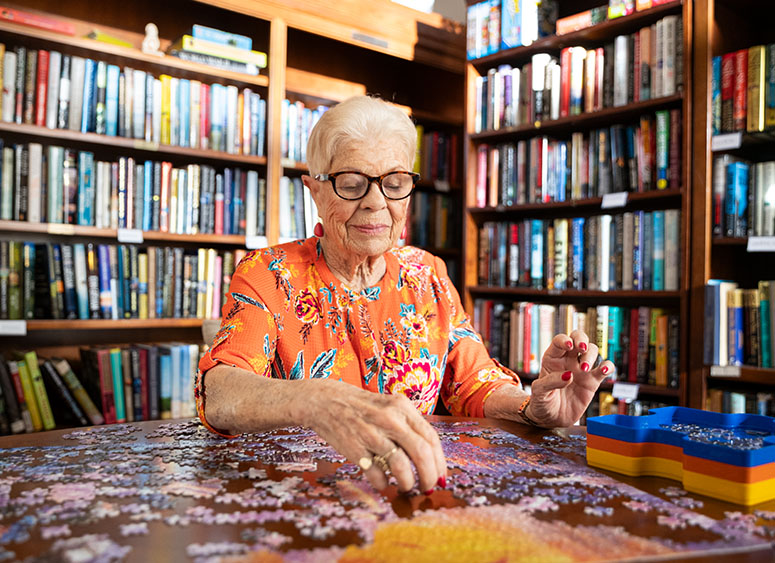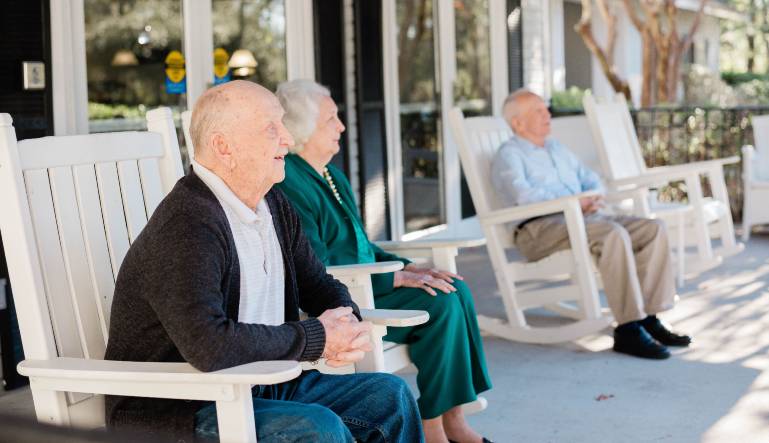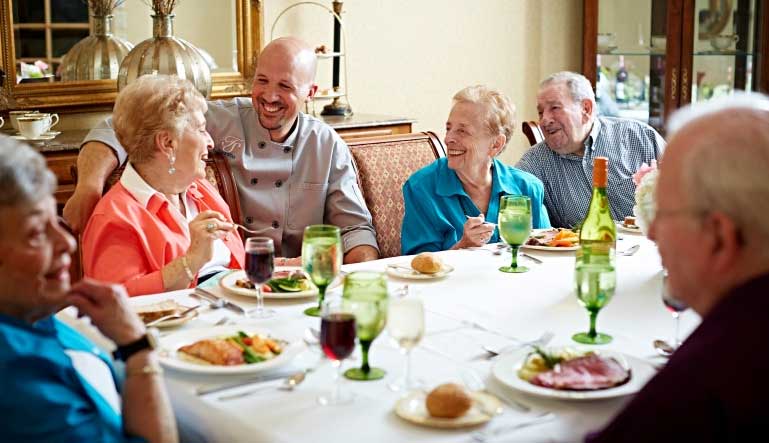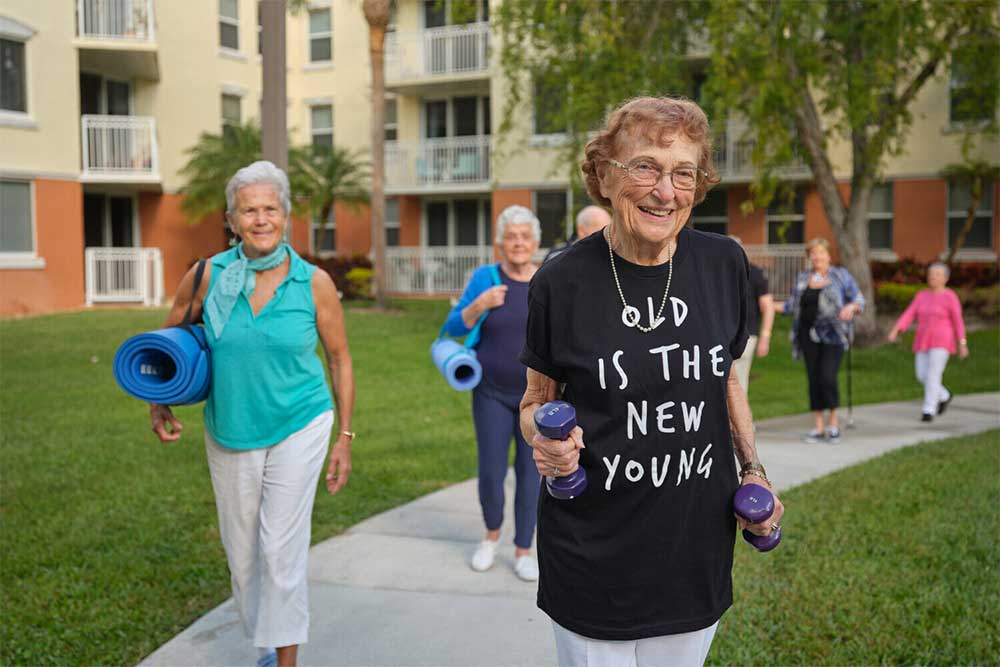Who says the joy of learning comes to a halt as you age? In 2024, aging does not mean slowing down. It just means that you now have the freedom to explore more, learn more, and engage your mind to remain sharp and inspired.
As we age, we pay greater attention to our physical wellness. Whether it’s preventative care or seeking the right remedies and treatment for what ails us – but what about our intellectual wellness? Have you ever thought about how to keep your mind active and engaged as you age?
In This Article
- What is Intellectual Wellness?
- The Benefits of Lifelong Learning for Seniors
- Ways to Enhance Intellectual Wellness
- How Senior Living Communities Can Support Intellectual Wellness
- EPIC Living at Five Star Senior Living
Let’s explore intellectual wellness and how you can keep your brain healthy!
What is Intellectual Wellness?
First and foremost, what is intellectual wellness? Intellectual wellness, for people of all ages, is about engaging in creative activities that help you enhance your knowledge and skills. Intellectual wellness has several vital components:
Curiosity:
Curiosity is about maintaining a sense of wonder and a desire to learn about new topics. It keeps the mind active and working. You’re never too old to be in awe.
Critical Thinking:
Analyzing information, solving problems, and making informed decisions make up critical thinking. It helps the brain navigate daily life and accept change.
Creativity:
Creativity gives you a healthy outlet in the form of art, writing, or music to channel emotions, both positive and negative.
Lifelong Learning:
Keeping the brain up and working at all ages is essential, especially as you grow older. Continuously seeking out new knowledge and experiences helps maintain cognitive health and adaptability.
The Benefits of Lifelong Learning for Seniors
Our brain health declines as we age, leading to impaired cognitive health and various personality changes. According to the National Institute on Aging (NIA), staying intellectually active can enhance brain health, delay cognitive decline, and improve overall mental functioning.
Lifelong learning offers many benefits for seniors, such as keeping your cognitive health up and functioning.
Cognitive Benefits:
Lifelong learning or continuous learning helps improve memory, attention, and problem-solving skills. Engaging in activities that stimulate cognitive health can slow the progression of cognitive decline and reduce the risk of dementia, as shown by research from NIA.
Emotional benefits:
Aging often leads to feelings of helplessness and hopelessness. Learning new skills and gaining knowledge fosters a sense of achievement. It keeps negative emotions at bay, enhancing self-esteem and emotional stability.
Social Benefits:
Lifelong learning often involves social interactions through classes, group activities, or discussions. These interactions help reduce feelings of isolation and loneliness. Access to knowledge also allows you to participate in classes and discussions energetically.
Sense of Purpose and Fulfillment:
Lifelong learning allows you to pursue your passions and interests, making you feel more satisfied with your life.
Ways to Enhance Intellectual Wellness
Who said that just because you’ve passed a certain age, you can’t train your mind to be sharp and active? Here are some fun, intellectual activities that will help you improve your intellectual wellness.
Reading:
This might sound old school, but this is one of the most effective ways to incorporate lifelong learning. You can read anything you like; it can be newspapers, novels, comics, nonfiction, poetry, you name it. Reading expands your knowledge and also helps you maintain concentration and focus.
Many Five Star Senior Living senior living communities have on-site libraries with great books to explore and even more comfortable places to read them.
Puzzles & Games:
It is said that an old man becomes a child again. Let’s bring that quote to life! Who says seniors can’t enjoy games? Apps and brain games like crossword puzzles, Sudoku, chess, or card games like bridge provide entertainment and keep those brain cells up and whirling.
Creative Hobbies:
Activities like painting, knitting, writing, or learning to play a musical instrument boost your creativity. They provide you with an outlet for self-expression and relaxation.
Learning New Skills:
There is no age to learn. Take up new skills like learning a new language, technology, gardening, or photography. It keeps you updated with the new generation while expanding your knowledge.
Social Interactions:
Activities like joining clubs, attending lectures, or participating in community events greatly boost your social presence. This banishes thoughts of loneliness and keeps you connected with like-minded individuals.
How Senior Living Communities Can Support Intellectual Wellness
Senior living communities can be a game changer for those looking to thrive intellectually. By taking care of everyday tasks like cooking, housekeeping, and home maintenance, these communities relieve you of the stress of household chores. This gives you more time and energy to focus on enriching activities, such as lifelong learning and intellectual engagement.
You also get to interact with like-minded individuals and develop fruitful friendships. From offsite outings and onsite amenities many senior living communities provide the resources and social opportunities to help keep your mental, emotional, and intellectual health in check.
EPIC Living at Five Star Senior Living
At Five Star Senior Living, your well-being is always our top priority. One way we support this is through our EPIC Living program which focuses on the four pillars of wellness: Emotional, Physical, Intellectual, and Community.
Through the EPIC Living programs or programming our communities are able to actively nurture residents’ creativity and support their cognitive health. From educational workshops and lectures to book clubs and crafting classes, Five Star Senior Living keeps your mind sharp and engaged.
Ready to learn more? Find a Five Star Senior Living community near you to discover how EPIC Living can enhance your life!
Contact Us Today
"*" indicates required fields










